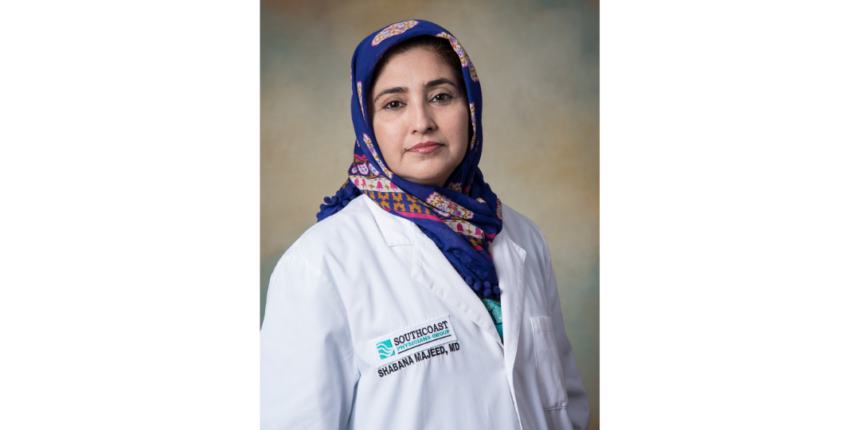Staff Profiles
Dr. Majeed spends Ramadan in fast, prayer, and reflection

Dr. Shabana Majeed, a Southcoast Health hospitalist, knew she wanted to be a physician when she was a first-grader in her native Pakistan.
Her parents expected their six daughters and two sons to become professionals, with the girls steered toward being educators or physicians. As it turned out, all the siblings received medical school scholarships and are specialists who practice around the globe — in the United States, the United Kingdom, Saudi Arabia, and Pakistan. In addition to practicing as a hospitalist at Charlton Memorial Hospital for nearly 15 years, Dr. Majeed completed a fellowship in obstetrics and gynecology.
“My parents really stood up for us,” Dr. Majeed says. “They were pro-education, and they wanted us all to be well-established and strong.”
Starting on March 22, Dr. Majeed and her family began celebrating Islam’s holiest month, Ramadan. Muslims around the world fast, pray, do good works, and give to charity during this period, thanking Allah for His blessings and for revealing the Quran, the Muslim holy book.
Ramadan is held in the ninth month of the Islamic calendar, with a start date that falls back by 10 days every year. During this month, Dr. Majeed awakens well before dawn to have breakfast and fortify herself for a day of strict fasting. Starting at sunrise, she will not eat or drink anything, not even a sip of water.
At sundown, Muslims around the world break their fast with dates and juice, she said, although the foods they eat after vary according to their location and culinary traditions.
Ramadan ends with the celebration of Eid al-Fitr, which falls on April 21 this year. Dr. Majeed and her family will start the day at their mosque in Sharon and go home to feast.
Dr. Majeed says her colleagues at Charlton Memorial understand that she is fasting, but she looks for no favors and won’t let her religious tradition interfere with her duties. That’s something she and her husband, Mohammed, a computer engineer who drew her to the United States in 1997, have also taught their daughter and two sons. They have played sports and attended classes without interruption during Ramadan.
In fact, the Islamic mandate to do good works during Ramadan may make Dr. Majeed a more attentive physician, helpful colleague, and compassionate community member. Muslims are required to give 2.5% of their wealth to charity and much of that generosity occurs during Ramadan.
“In this month of fasting, we think about how we can improve every year to be good human beings and good Muslims,” she says. “I want it to be as perfect as I can make it. If I am working, I want to be more polite, more helpful to my patients. And I want to contribute more to my community.”
For more Southcoast staff stories, visit Staff Profiles | Southcoast Health.
